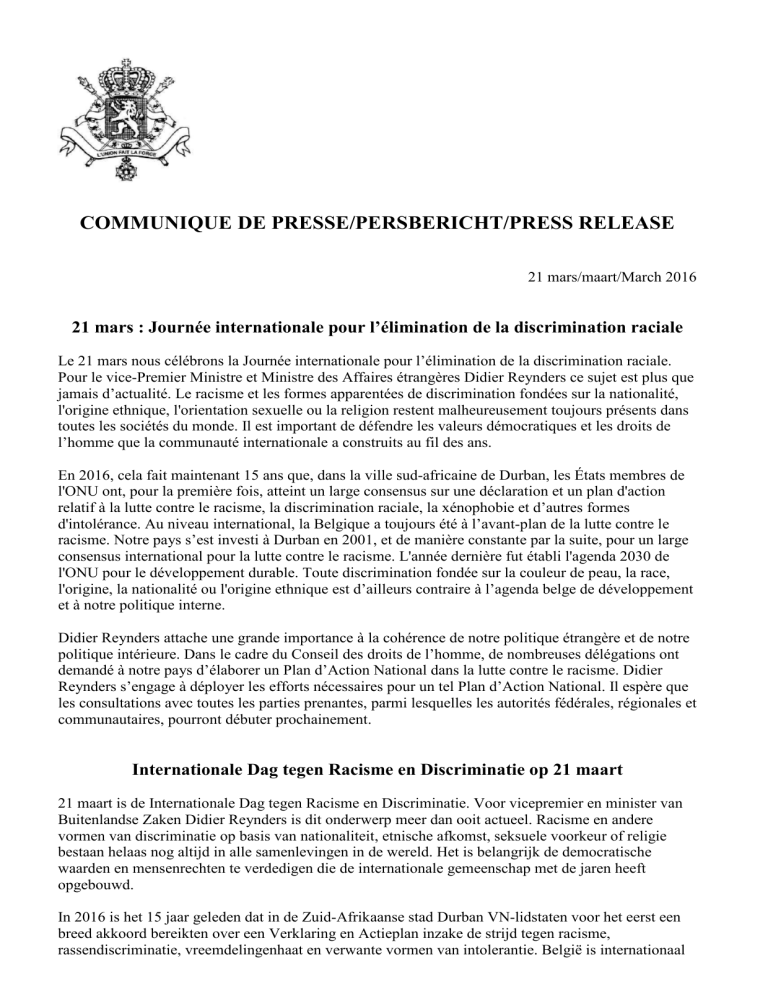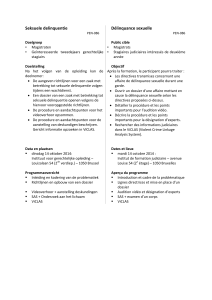
COMMUNIQUE DE PRESSE/PERSBERICHT/PRESS RELEASE
21 mars/maart/March 2016
21 mars : Journée internationale pour l’élimination de la discrimination raciale
Le 21 mars nous célébrons la Journée internationale pour l’élimination de la discrimination raciale.
Pour le vice-Premier Ministre et Ministre des Affaires étrangères Didier Reynders ce sujet est plus que
jamais d’actualité. Le racisme et les formes apparentées de discrimination fondées sur la nationalité,
l'origine ethnique, l'orientation sexuelle ou la religion restent malheureusement toujours présents dans
toutes les sociétés du monde. Il est important de défendre les valeurs démocratiques et les droits de
l’homme que la communauté internationale a construits au fil des ans.
En 2016, cela fait maintenant 15 ans que, dans la ville sud-africaine de Durban, les États membres de
l'ONU ont, pour la première fois, atteint un large consensus sur une déclaration et un plan d'action
relatif à la lutte contre le racisme, la discrimination raciale, la xénophobie et d’autres formes
d'intolérance. Au niveau international, la Belgique a toujours été à l’avant-plan de la lutte contre le
racisme. Notre pays s’est investi à Durban en 2001, et de manière constante par la suite, pour un large
consensus international pour la lutte contre le racisme. L'année dernière fut établi l'agenda 2030 de
l'ONU pour le développement durable. Toute discrimination fondée sur la couleur de peau, la race,
l'origine, la nationalité ou l'origine ethnique est d’ailleurs contraire à l’agenda belge de développement
et à notre politique interne.
Didier Reynders attache une grande importance à la cohérence de notre politique étrangère et de notre
politique intérieure. Dans le cadre du Conseil des droits de l’homme, de nombreuses délégations ont
demandé à notre pays d’élaborer un Plan d’Action National dans la lutte contre le racisme. Didier
Reynders s’engage à déployer les efforts nécessaires pour un tel Plan d’Action National. Il espère que
les consultations avec toutes les parties prenantes, parmi lesquelles les autorités fédérales, régionales et
communautaires, pourront débuter prochainement.
Internationale Dag tegen Racisme en Discriminatie op 21 maart
21 maart is de Internationale Dag tegen Racisme en Discriminatie. Voor vicepremier en minister van
Buitenlandse Zaken Didier Reynders is dit onderwerp meer dan ooit actueel. Racisme en andere
vormen van discriminatie op basis van nationaliteit, etnische afkomst, seksuele voorkeur of religie
bestaan helaas nog altijd in alle samenlevingen in de wereld. Het is belangrijk de democratische
waarden en mensenrechten te verdedigen die de internationale gemeenschap met de jaren heeft
opgebouwd.
In 2016 is het 15 jaar geleden dat in de Zuid-Afrikaanse stad Durban VN-lidstaten voor het eerst een
breed akkoord bereikten over een Verklaring en Actieplan inzake de strijd tegen racisme,
rassendiscriminatie, vreemdelingenhaat en verwante vormen van intolerantie. België is internationaal
altijd een voorvechter geweest in de strijd tegen racisme. Ons land heeft zich in 2001 in Durban en
daarna altijd ingezet voor een brede internationale consensus voor de strijd tegen racisme. Vorig jaar is
de VN-agenda voor duurzame ontwikkeling 2030 vastgelegd. Discriminatie op basis van kleur, ras,
afkomst, nationaliteit of etnische oorsprong is strijdig met de Belgische ontwikkelingsagenda en met
het binnenlandse beleid.
Didier Reynders hecht belang aan de samenhang tussen ons buitenlands en binnenlands beleid. In het
kader van de Mensenrechtenraad werd ons land door heel wat delegaties gevraagd een Nationaal
Actieplan in de strijd tegen racisme uit te werken. Didier Reynders verbindt zicht ertoe om zich voor
zo een Nationaal Actieplan in te zetten. Hij vertrouwt erop dat het overleg met alle betrokkenen
binnenkort van start kan gaan, waaronder de federale overheid en de gewesten en gemeenschappen.
21 March: International Day for the Elimination of Racial Discrimination
21 March is the International Day for the Elimination of Racial Discrimination. For Deputy Prime
Minister and Minister of Foreign Affairs Didier Reynders, this topic is more relevant than ever.
Racism and other forms of discrimination based on nationality, ethnic origin, sexual orientation or
religion unfortunately still exist in all societies in the world. It is important to defend the democratic
values and human rights that the international community has built over the years.
In 2016 it is 15 years since UN Member States reached in the South African city of Durban, for the
first time, a broad agreement on a Declaration and Action Plan on combating racism, racial
discrimination, xenophobia and related forms of intolerance. Belgium has internationally always been
at the forefront in the fight against racism. Our country has, in Durban in 2001 and thereafter, always
pushed for a large international consensus on the fight against racism. Last year, the 2030 UN agenda
for Sustainable Development was established. Discrimination based on color, race, origin, nationality
or ethnic origin is contrary to the Belgian development agenda and our internal policy.
Didier Reynders attaches great importance to the coherence between our foreign and domestic policy.
In the context of the Human Rights Council our country was asked by many delegations to elaborate a
National Action Plan against racism. Didier Reynders is committed to make the necessary efforts for
such a National Action Plan. He trusts that the consultations with all stakeholders, among which the
federal authorities as well as the regions and communities, will be able to start shortly.











